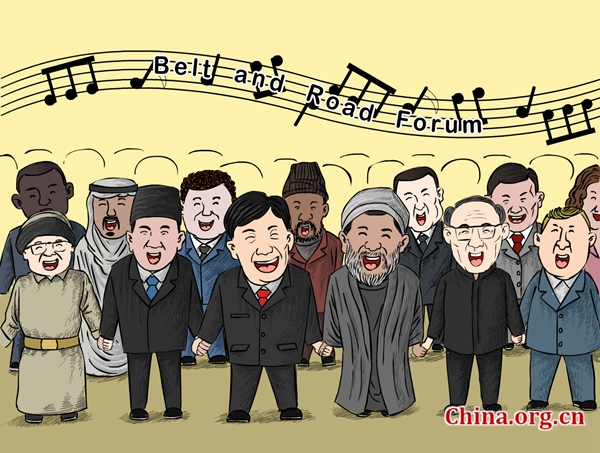India should join China’s B&R Initiative in the best sense
- By Rabi Sankar Bosu
 0 Comment(s)
0 Comment(s) Print
Print E-mail China.org.cn, April 20, 2017
E-mail China.org.cn, April 20, 2017
|
|
|
The Belt and Road Forum (BRF) for International Cooperation is scheduled to be host on May 14-15 in Beijing. [Zhang Xueshi/China.org.cn] |
The Forum will be the most important international gathering in building consensus based on its theme of "Cooperation for Common Prosperity." It is anticipated China will offer a meeting of real quality, opening a great new chapter of mutually-beneficial cooperation.
The Belt and Road Initiative (BRI), which comprises the Silk Road Economic Belt and the 21st Century Maritime Silk Road, was first put forward by President Xi in 2013. It is fair to say that over the past three years or so, the BRI has become the best platform for international cooperation with the brightest prospects in the world.
The Forum will be attended by at least 28 heads of state and government leaders Other delegates include officials, entrepreneurs, financiers and reporters from 110 countries, and representatives of 61 international organizations. In total, more than 1,200 delegates and participants from various countries and regions are expected to attend. Unfortunately, India has yet decided on its representation at the summit.
While more and more countries and international organizations are joining the BRI – more than 100 to date - India's insistence on keeping a distance poses something of a conundrum.
By not joining the BRI, India is missing out on a great opportunity for economic development through involvement in a grand trade and infrastructure plan designed not just for China's benefit but also to create coordinated regional development.
At the upgraded China-India Strategic Dialogue in Beijing on February 22 this year, Indian Foreign Secretary Subrahmanyam Jaishankar articulated India's official position on the $46 billion China-Pakistan-Economic-Corridor (CPEC) project, claiming it violated India's sovereignty as it runs through “Pakistan-occupied Kashmir” (PoK).
He said that India couldn't join a program that hurts its territorial interests. India fears that the CPEC will tend to grant legitimacy to Pakistan's control over the Kashmir region, and by promoting the construction of the corridor, China intends to meddle in the longstanding Kashmir dispute.
It is unwise to think that China does not respect India's sovereignty concerns. As Fu Xiaoqiang, researcher from the China Institute of Contemporary International Relations said, “China has no intention of interfering in the territorial dispute between India and Pakistan. China has long believed that the two neighbors should solve their disputes through dialogue and consultations, and it has repeatedly emphasized that the construction of the CPEC doesn't affect its stance on the issue.”
Therefore, it is to be hoped that India will abandon its “cliché mentality” to oppose China's grand project as “geopolitical competition”.
India is worried that China, under the framework of the BRI, might chip away at its regional leadership. It's really ridiculous that on the one hand, India hopes to deepen economic cooperation with China to promote its "Make in India" campaign, while bring concerned about China's growing influence in South Asia.
India needs to embrace China's BRI with an open attitude as most Asian countries are participating in the Initiative in a spirit of openness for economic benefits.
Without doubt, the BRI is an opportunity to modernize India's Stone Age infrastructure and pave the way for rapid industrialization and employment growth. Partnering with China, India can reap economic benefits from the BRI in the long run. Joining BRI will not only increase India's trade substantially, it will also give better access to funds through the Asian Infrastructure Investment Bank (AIIB) and the Silk Road Fund.
Further, it will give it better access to the Middle East's energy resources and increase people-to-people exchanges with the other countries, as the BRI aims to build land and sea links between China and Europe through roads, railway lines, power projects and ports in as many as 64 countries. Instead of opposing CPEC, India should look at the wider picture of the opportunities it offers as part of the BRI.
The sound and stable development of China-India relations in recent years has proved that the 'dragon' and the 'elephant' can join hands to speed up cooperation and usher in a better future for all, from Asia to World, "boosting cooperation and realizing win-win development."
Rabi Sankar Bosu, Secretary of New Horizon Radio Listeners' Club, West Bengal, India
Opinion articles reflect the views of their authors only, not necessarily those of China.org.cn.







Go to Forum >>0 Comment(s)